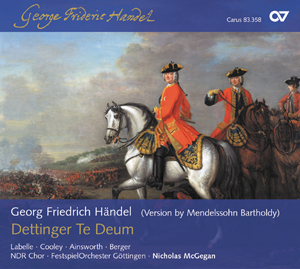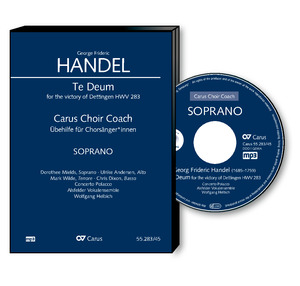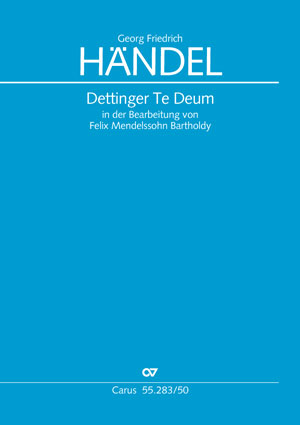
Dettinger Te Deum
The present recording honors three important composers celebrating major anniversaries in 2009: Handel, Mendelssohn and Haydn. George Frideric Handel’s Dettinger Te Deum is presented here not in its original version, but rather in an arrangement by Felix Mendelssohn Bartholdy, who rendered outstanding service to music not only through the revival of Bach’s choral works, but also through those of Handel. In addition, The Storm, the little-known choral work by Joseph Haydn, is also to be heard here. He composed it during his first visit to England and later arranged it for a large ensemble. The CD is rounded off with an homage by Luigi Cherubini to Joseph Haydn, which he had composed as a result of the mistaken report in 1805 of Haydn’s death. The piece was first performed after Haydn had died. Nicholas McGegan conducts these performances with renowned soloists, the FestspielOrchester Göttingen and the NDR Chor (North German Radio Choir).
Purchase
Additional product information
Contents
-
Composer
Georg Friedrich Händel
| 1685-1759George Frideric Handel put his exceptionally versatile compositional abilities to the test at an early age. After moving to London in 1712, where he was appointed Composer of Musick for His Majesty’s Chapel Royal in 1723, he wrote numerous masterpieces for the royal court as well as his major opere serie. For many years he enjoyed triumphant successes with his operas, which were sung by outstanding performers, with serenades, and later also with oratorios such as Saul and Israel in Egypt. Over the years Handel’s reputation grew far beyond the city where he worked; some of his choral works, particularly Messiah, have enjoyed a performance tradition which remains unbroken to this day, and are sung by choirs throughout the world. Personal details
-
Preface writer
Dorothea Schröder
-
Ensemble
FestspielOrchester Göttingen
The FestpielOrchester Göttingen (FOG) has convinced audiences and critics alike since its foundation in 2006, and it is especially appreciated for the richness of its tone color and its light, flexible and sensual sound. The FOG includes specialists in authentic period performance practice from such internationally famous early music ensembles as Les Arts Florissants, the Akademie für Alte Musik Berlin, Concerto Köln, the Freiburger Barockorchester, the Philharmonia Baroque Orchestra (San Francisco), Il Complesso Barocco, and the Orchestra of the 18th century. Under the direction of Nicholas McGegan they have become a homogeneous ensemble, which has confirmed the reputation of the Internationale Händel-FestspieIe Göttingen as an innovative and first class festival. During the 2008 festival season the orchestra has taken part in the oratorio Samson, giving guest performances in Dresden, Hanover, Kassel and Halle/Saale, which aroused enthusiasm in both the audiences and the press: “The Göttinger play like gods” wrote a critic in the Mitteldeutsche Zeitung following the concert in Halle/Saale. During the Handel celebration year 2009, the 250th anniversary of the composer’s death, the FestspielOrchester Göttingen is taking part in a staged opera production at venues including the Drottningholm Slotstheater in Sweden. Personal details
-
Ensemble
NDR Chor
Ever since the NDR Choir came into existence in 1946, it has been committed not only to the classical and romantic repertoire but also to contemporary music, which had been banned for a considerable period prior to the choir’s establishment. As a result, the preparation and performance of Schönberg’s unfinished opera Moses und Aron was the focus of worldwide attention in the post-war years. Especially under the direction of Helmut Franz, Max Thurn’s successor, a-cappella literature became a special trade- mark of the choir, a tradition maintained by subsequent conductors such as Roland Bader, Horst Neumann, Robin Gritton and Hans-Christoph Rademann. The choir has also enjoyed the stimulus of working with notable guest conductors such as Eric Ericson, Marcus Creed, Michael Gläser and Rupert Huber. Since the 2008/09 season, Philipp Ahmann has been choral director of the NDR Choir. Among the highpoints of recent years have been performances of Handel’s Israel in Egypt, the Ligeti Requiem and Schönberg’s Gurrelieder. Of the choir’s many CD recordings, the a-cappella works by Max Reger (dir. by H.-Chr. Rademann), which received the 2005 “Prize of the German Record Critics,” deserves special mention. Plans for the 2009/2010 season include Haydn’s The Creation under Martin Haselböck and a concert performance of Bizet’s opera Carmen as well as the choir’s own subscription series under the direction of Philipp Ahmann. Personal details
-
Conductor
Nicholas McGegan
For the London Independent Nicholas McGegan is “one of the finest baroque conductors of his generation,” and for the New Yorker magazine, “an expert in 18th century style.” But the Cleveland Plain Dealer was more direct when it praised Nicholas McGegan for “bringing rhythmic zest to all things baroque.” And as such he is known throughout the world for performances that match authority with enthusiasm, scholarship with joy, and curatorial responsibility with evangelical exuberance. Through more than twenty years as its music director, McGegan has established the San Francisco-based Philharmonia Baroque Orchestra as the leading Baroque ensemble in America – and at the forefront of historical performance practice worldwide, thanks to notable appearances at Carnegie Hall, the London Proms, the Amsterdam Concertgebouw, and the International Handel Festival, Göttingen where he has been artistic director since 1991. In Göttingen and with the PBO he has defined an approach to period style that sets the current standard: probing, serious but undogmatic, recognizing that the music of the past does not belong in a museum or in academia, but in vigorous engagement with an audience, for pleasure and delight on both sides of the stage. He has been a pioneer in the process of exporting historically informed practice beyond the small world of period instruments to the wider one of conventional symphonic forces. His discography includes the world premiere recording of Handel’s oratorio Susanna, which attracted both a Gramophone Award and Grammy nomination, and recent issues on Carus of the same composer’s Solomon, Samson, and Acis and Galatea (the latter a rarity in that it unearths the little-known version adapted by Felix Mendelssohn). Born in England, Nicholas McGegan was educated at Oxford, Cambridge and the Royal College of Music, London. His awards include an honorary professorship at Georg-August University, Göttingen, and an official Nicholas McGegan Day, declared by the Mayor of San Francisco in recognition of two decades of distinguished work with the Philharmonia Baroque. He holds an honorary degree at London’s Royal College of Music and the Handel Prize of the Halle Handel Festival. Personal details
-
Soloist - soprano
Dominique Labelle
Born in Montreal, Dominique Labelle first rose to prominence as Donna Anna in Peter Sellar’s production of Mozart’s Don Giovanni, which she performed in New York, Paris and Vienna. Since then she has been celebrated in a repertoire ranging from Bach to 2006 Pulitzer Prize winner, Yehudi Wyner. She has worked with such conductors as Boulez, Zinman and McGegan and is a regular guest soloist in Europe. Highlighting her wide-ranging repertoire are acclaimed performances of Handel’s Belshazzar and Bach’s St. Matthew Passion, as well as works by Mahler, Verdi’s Requiem and Wyner’s songs. She has been enthusiastically received in Göttingen in several roles, including the title-role in Handel’s Rodelinda (2000) and Armida in Rinaldo (2004), as well as Angelica in Orlando (2008) and in the 2001 world premiere of Handel’s Gloria. Notable successes in the operatic field have included the title-role in Lucia di Lammermoor and Violetta in La Traviata. Her discography features works spanning the 17th and 21st centuries; a recording of Handel’s Arminio was awarded the Handel Prize in 2002. Personal details
-
Soloist - tenor
Thomas Cooley
Thomas Cooley, tenor, was born in Minnesota and studied voice at the university there, then at the Richard Strauss Conservatory in Munich. He has participated in master classes in Aldeburgh, England, with Anthony Rolfe-Johnson and Ian Partridge, and has studied the art of Lieder singing with Peter Schreier and Rudolf Piernay. His operatic repertoire encompasses Mozart, Rossini, Handel and Monteverdi. He was a member of the company at the Staatstheater am Gärtnerplatz in Munich from 2002–06. The major works by Monteverdi, Bach, Handel, Haydn, Mozart, Mendelssohn and Britten are at the center of his repertoire, with a special emphasis on the Bach Evangelist roles and the great tenor parts in Handel. Important recent concert engagements included Bach’s St. Matthew Passion under Helmuth Rilling in Carnegie Hall, Haydn’s Nelson Mass under Welser-Möst, Britten’s War Requiem with the Munich Bach Chor, Edward Elgar’s Dream of Gerontius with the Sing-Akademie Berlin and Penderecki’s Credo, conducted by the composer. Thomas Cooley has also devoted himself to the art song, and he has made several recordings for Bayerischer Rundfunk, including Britten’s Holy Sonnets of John Donne and his Michelangelo Sonnets, Brahms Liebesliederwalzer and Schubert songs. Personal details
-
Soloist - tenor
Colin Ainsworth
Colin Ainsworth has built an international reputation based on exceptional sing-ing, impeccable diction and a diverse range of repertoire. He débuted with the Royal Opera House, Covent Garden, and at the Edinburgh International Festival in the world première of MacRae’s The Assassin Tree, and with the Greek National Opera as Orphée in Gluck’s Orphée et Euridice. The Canadian tenor is in demand for the works of Bach, Handel, Haydn and Mozart as well as operas ranging from Monteverdi to Britten. Notable engagements include his debut with Philharmonia Baroque of San Francisco under Nicholas McGegan in the title role of Rameau’s Pygmalion and performances at the Göttingen Handel Festival, also with McGegan. Under the baton of Andrew Parrott he sang the roles of Orphée in Gluck’s Paris version of Orphée et Euridice, Renaud in Lully’s Armide and Don Ottavio in Don Giovanni. Further credits include Lully’s Persée and Charpentier’s Medée, both conducted by Hervé Niquet; Rameau’s Castor et Pollux with Yves Abel for L’Opéra français de New York and Tamino in Die Zauberflöte. CD releases include Castor et Pollux, Vivaldi’s La Griselda, ‘Schubert Among Friends’ with Gerald Finley, ‘Gloria in excelsis Deo’ with Tafelmusik, and Derek Holman’s cycle The Heart Mislaid. Personal details
-
Soloist - bass
William Berger
William Berger, described by Gramophone Magazine as “ […] one of the best of our younger baritones,” is an Associate and graduate of the Royal Academy of Music and has been a member of the “Young Singers” programme at English National Opera. After his opera debut as Ormonte in Partenope in Göttingen (2001), he went on to sing Zebul in Jephtha and Mercurio in Atalanta there. He has sung in operatic productions at the Festival Lyrique d’Aix-en-Provence, the Handel & Haydn Society (Boston) and with the Mark Morris Dance Company. His roles include Guglielmo (Così fan Tutte), Don Giovanni, Papageno (Die Zauberflöte), Count Almaviva (Le Nozze di Figaro) and Harasta (The Cunning Little Vixen). William Berger’s concert repertoire ranges from Bach’s Christmas Oratorio, Handel’s Apollo e Dafne, Carmina Burana and Fauré’s Requiem to the world premiere of Michael Stimpson’s The Angry Garden. He has given song recitals at Wigmore Hall and the Oxford Lieder Festival. Numerous CD recordings illustrate his artistic achievements. Personal details
Reviews
[...] Seine Deutung bewegt sich sehr schön ausgeglichen zwischen Feierlichkeit und Intimität. So bleibt die musikalische Spannung stets erhalten, gefördert durch einen beweglichen und transparenten Chor- und Orchesterklang. [...]
pizzicato, 01/2010
pizzicato, 01/2010
Frequent questions about this work
 There are no questions and answers available so far or you were unable to find an answer to your specific question about this work? Then click here and send your specific questions to our Customer Services!
There are no questions and answers available so far or you were unable to find an answer to your specific question about this work? Then click here and send your specific questions to our Customer Services!





